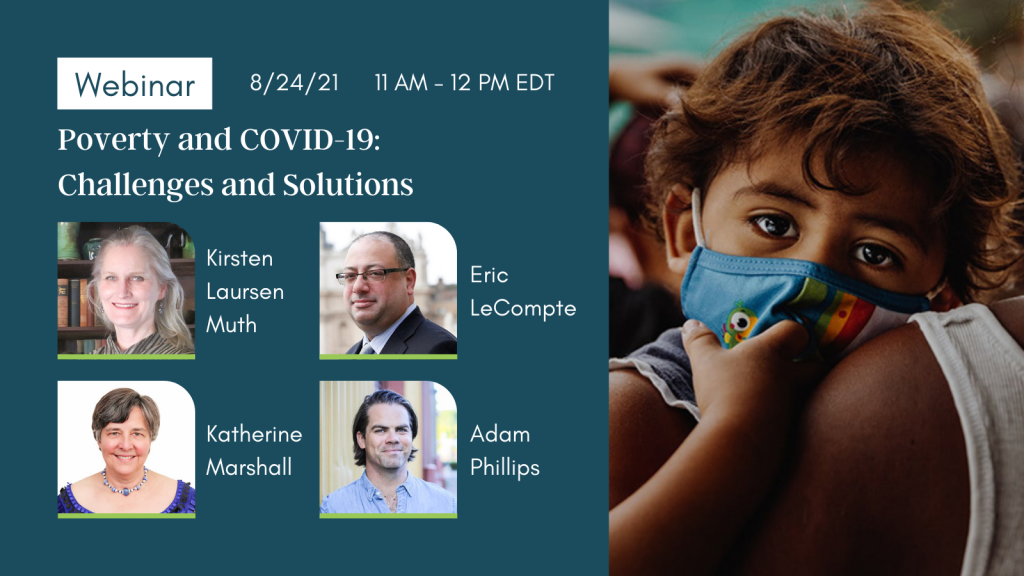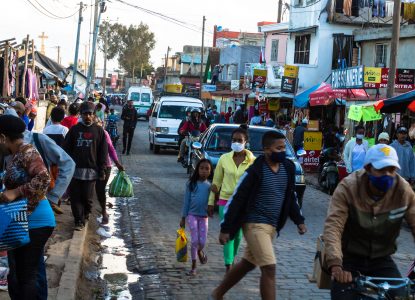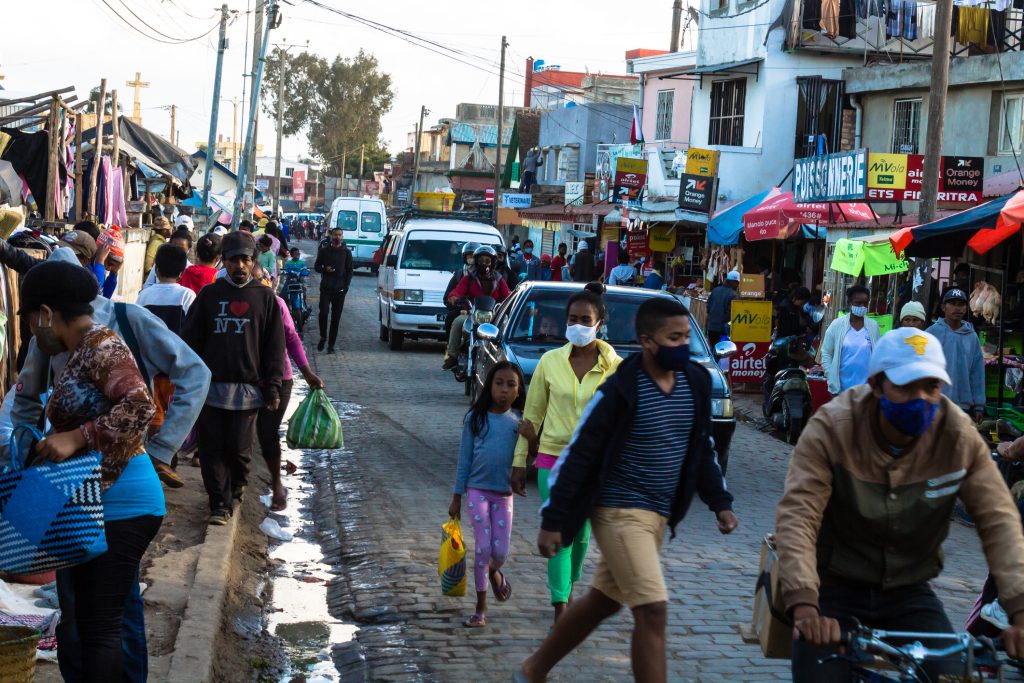By JoAnne Wadsworth, Communications Consultant, G20 Interfaith Forum
– – –
On Tuesday, August 24th, the G20 Interfaith Forum, in partnership with the Berkley Center at Georgetown University, Fscire, Jubilee USA, and the Joint Learning Initiative on Faith and Local Communities, held a webinar entitled “Poverty and COVID-19: Challenges and Solutions.” The webinar focused on what faith-based organizations and communities can do on the international stage to address mounting poverty and inequality across the globe, notably those arising from the COVID-19 pandemic. Panelists included Kirsten Laursen Muth, CEO of the Joint Learning Initiative on Faith & Local Communities; Eric LeCompte, executive director of Jubilee USA Network; and Adam Phillips, director of USAID’s Center for Faith-Based and Neighborhood Partnerships and USAID’s Local, Faith, and Transformative Partnerships Hub. Professor Katherine Marshall, Senior Fellow at Georgetown University’s Berkley Center and Vice President of the G20 Interfaith Forum, moderated the discussion.

Marshall introduced the topic at hand and the webinar’s objectives, notably clarifying why it related to the G20 and the G20 Interfaith Forum. The event, she noted, could be seen as a “teaser”—both to the upcoming forum this September in Bologna, Italy, and to future meetings where the broad reforms needed to address growing issues of poverty and inequality could be explored in greater depth.
“This webinar focuses on important challenges that will be central to the meeting of G20 Interfaith Forum, Bologna September 12-14 and the G20 leaders’ summit at the end of October. They are also central to the World Bank/IMF meetings in mid-October and countless discussions in between. COVID adds vital new dimensions. The core question today is how religious communities are engaged in the global discussions – are they advocating, reacting, acting? The specific issues at stake surround inequality, among nations also within nations, and thus those who are most vulnerable. Though the G20 was built around a crisis mandate, looking at immediate issues of survival, hunger, and health, we also need to look ahead to take advantage of this moment to advance longer-term reforms.”
She introduced the speakers, who provided an overview of what their affiliated organizations are doing to address the issues at hand.
Kirsten Laursen Muth
Muth spoke about the efforts and focus of the Joint Learning Initiative on Faith & Local Communities (JLI): to shift the “center of gravity” in these policy-based initiatives to the voices of less-advantaged partners and actors.
“One of the challenges we have in this space is how siloed some of these conversations have become. How much are the topics we’re working on in such depth actually accessible to people? How do we make these conversations available and help them advance more meaningful input into the agendas that affect people’s lives? So JLI is trying to organize our work in ways that help people do that.”
Eric LeCompte
LeCompte provided a brief overview of Jubilee USA’s history and purpose, starting with the call of major religious leaders in the mid-1990’s to confront the crisis of debt that so many developing countries were struggling with. In the spirit of the ancient Jewish tradition of taking a “Jubilee year,” forgiving debts and freeing slaves in celebration, religious leaders established a network to call for debt forgiveness in developing countries. To date, more than $100 Billion of debts have been canceled, enabling more access to education, healthcare, infrastructure, etc. in these countries.
“Jubilee is the profound assessment of living in a world free from inequality and extreme poverty. So it isn’t just shifting debt policies—it’s anticorruption policies, trade policies, tax policies, and more. We’re trying to address these structural issues in order to protect the most vulnerable.”
Adam Phillips
Phillips focused his comments on how COVID-19 and the effects the pandemic at large have been devastating in almost every space in the developing world—seen in skyrocketing unemployment, a rising global extreme poverty rate for the first time in 20 years, serious risks to the health and wellbeing of children, reverses of a decade of global nutrition programs, COVID-19 orphans, immense productivity losses, and more.
“Since the beginning, USAID has recognized the pandemic’s deadly nature and also its effects on the developing world. With these realities come a sense of hopelessness and despair in the international community. But we’re determined to create more faith engagement, working with individuals and organizations embedded in local communities to make a difference.”
Question and Answer Session
Marshall then posed a series of questions, some directed toward all of the panelists, and some taken from event attendees. She referred to the Chinese character for “crisis,” which contains the symbols for both “danger” and “opportunity,” then challenged the panelists to address these questions:
How can we take advantage of this moment, and what critical issues do you see looking ahead?
Kirsten Laursen Muth:
As we build back better, there needs to be a really intentional focus not just on specific sectoral needs, but on accountability mechanisms that show how power and leadership are being shifted. Finance and investment can be very complicated, and we need to make sure that we’re making these things more accessible to everyone.
Eric LeCompte:
In the upcoming G20 Meetings this year, world leaders will make serious make-or-break decisions dealing with health, debt, poverty, and climate. They need to make decisions on vaccine distribution, find solutions to cancel and cut debts (giving better attention to middle income countries), and also look at some big trade decisions related to developing countries being able to access vaccines with a temporary patent waiver.
Indonesia will take over next year, and that will be the time to make decisions on international financial architecture—putting in place policies to avoid future crises.
Adam Phillips:
We know that core, crucial decisions will be made at many of these tables with many of these multilateral partners. So whether it’s climate change, COVID vaccines, debt, or more, that’s why we’re showing up to these things—namely the G20 Interfaith Forum. That’s why we’re coming to these tables.
What can we do to create a lasting impact on these issues?
Eric LeCompte:
It’s good that world leaders are communicating more, but my concern is that we’ll fail to implement actual solutions to the problems we’re facing—much like what happened after the 2008 financial crisis. If we’d implemented what we agreed to then, we wouldn’t be facing what we’re facing now.
Of course the UN is important, but where the decisions are being made is the G7, the G20, and the IMF. If we’re going to be weighing in on these decisions, we need to actually be talking to the people who are making the decisions. It’s absolutely crucial that we’re focusing on the decision makers.
Kirsten Laursen Muth:
We still live in a very project-based world where aid is driven by western agendas and indicators. I think there has to be more investment in the organizations themselves beyond specific projects. We need to make investments in human capital and the infrastructure of these smaller organizations. Though these project-based investments provide good indicators, they aren’t creating as much of a lasting infrastructure for the future as we need.
Adam Phillips:
Accountability and transparency are key to a better future. And it’s faith-based groups that have been making the biggest differences in these areas, and they are struggling. That’s why we, in this new administration, want to show up to these multilateral settings. That’s why we’re so eager to develop this faith engagement policy, and we encourage this group to lean in and help us get smarter on it as we look at these critical issues.
Which religious groups should we be working with, and which tables should we be inviting them to?
Eric LeCompte:
There is a lot of work still to do, but because of the mobilization of so many groups, with religious groups at the forefront, we’ve seen some pretty amazement movement.
268 labor unions, environmental groups, and religious institutions gathered to call for emergency aid in the developing world, and that resulted in $650 Billion in “special drawing rights”—an emergency currency used by countries in times of crisis.
We should celebrate what the religious community has done so far, with our eyes wide open to the work we have to do to address what is to come.
Conclusion
Marshall thanked the participants and attendees, and encouraged all to continue the conversation.
“This meeting has been a call to attention as well as a call to action. These ‘tables’ where people will meet this fall are where many of these crucial decisions are going to happen. We must, therefore, continue and deepen the exchange we have witnessed here.”
– – –
JoAnne Wadsworth is a Communications Consultant for the G20 Interfaith Association and acting editor of the “Viewpoints” blog. To see more on the webinar, including links to the video recording when it’s available, see the event page.



